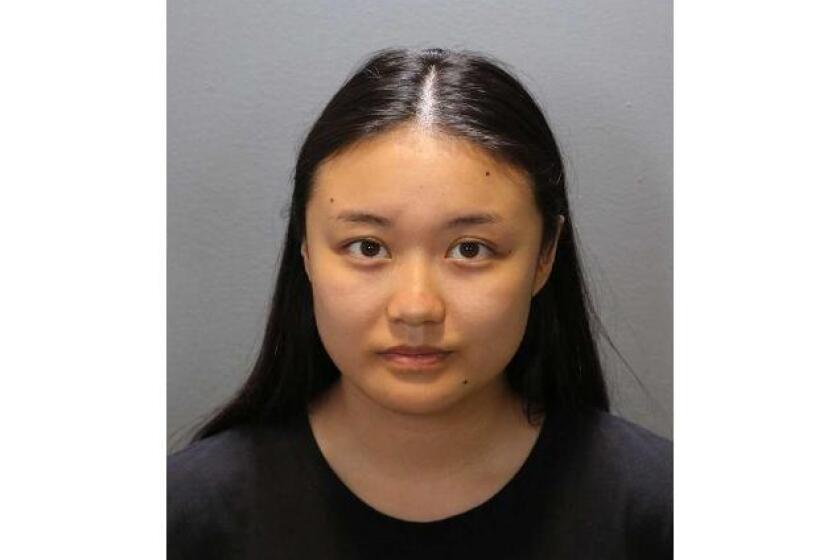Jurors’ 122-Query Survey: Sex, Pot and the Mundane
The questions were unusual, but then so is the case.
Potential jurors in the highly publicized trial of three young men accused of raping a 16-year-old girl filled out a form containing 122 questions about their experiences and beliefs, including highly personal queries that asked whether they had used sex toys, watched X-rated movies, viewed pornographic websites or were “sexually adventurous.”
Legal experts were divided over the propriety of the questions, contained in a 23-page jury survey that Orange County Superior Court Judge Francisco Briseno released Tuesday. He ordered that the potential jurors’ responses remain sealed.
Barbara Babcock, a law professor at Stanford University, said she had never heard of prospective jurors being queried on such personal issues. “This is going too far in invading the privacy of jurors,” she said. “It gives me the creeps.”
But others described the questions as predictable. “Because of the nature of the case and the defense, these are the types of questions we’d expect,” said Laurie Levenson, a professor at Loyola Law School and a former federal prosecutor.
Questions pertaining to sex accounted for about six of the queries put to the potential jurors. Such questionnaires, most common in high-profile cases, are compiled by lawyers from both sides to help them and the judge determine if prospective jurors can weigh the evidence impartially. Deputy Dist. Atty. Dan Hess said he objected to the sex questions but the judge allowed them.
The three teenage boys are accused of raping the girl in July 2002 at the Corona del Mar home of Orange County Assistant Sheriff Don Haidl, father of one of the defendants. Prosecutors allege the boys assaulted the unconscious girl with a Snapple bottle, a pool cue and a lighted cigarette and that Gregory Scott Haidl, 18, videotaped the event. Kyle Joseph Nachreiner, 19, and Keith James Spann, 19, are the other defendants. All three lived in Rancho Cucamonga at the time of the incident.
Defense attorneys say the girl, who began her testimony Tuesday in a Santa Ana courtroom, wanted to be a porn star and orchestrated the encounter.
The key piece of evidence in the case is the 21-minute videotape.
Joseph G. Cavallo, Gregory Haidl’s attorney, said in an interview that lawyers had to tread a fine line in drawing up the questions to elicit important information and yet not offend or prejudice someone who would serve on the jury.
Cavallo said the defense asked about pornography because jurors, in essence, would view a pornographic film, and he didn’t want them to be stunned by the sexual activity itself. “Pornography is one of the focuses of the trial. We want open-minded, fair, knowledgeable jurors,” he said. “We don’t want someone who is shocked for reasons other than what the evidence depicts.”
And why the question about sex toys? He said evidence yet to be introduced will show the girl used one. “We want people to understand that sex toys exist and people use them,” he said.
He said that no single question would have led him to disqualify a potential juror.
Jason Bloom, a jury consultant in Dallas, said that besides uncovering bias, questionnaires can be a way for attorneys to lay their groundwork. “You can plant and suggest things that frame juror attitudes about the case before they’ve heard anything,” Bloom said.
Prospective jurors were also asked if they have friends or relatives in law enforcement or whether they have been crime victims. They were asked about their education, their employment and what organizations, such as women’s rights groups, they’ve belonged to.
They were asked about the legal system: “Will you judge the believability of a peace officer by the same standards that you use to judge the believability of other witnesses?”
But the survey homes in on questions that specifically pertain to this case. They were asked if rape laws are too lenient, about right or too strict, and how common date rape is.
Potential jurors were asked if their children had smoked marijuana, drank alcohol or visited pornographic Internet sites as teenagers. They were asked if they considered themselves “social” in high school and college.
The questionnaire told would-be jurors what they would see in the videotape: “Can you watch such a video and still remain a fair and impartial juror throughout the entire trial?”
Legal experts said one advantage of a questionnaire is that people can answer intimate questions on the written page, instead of out loud to a filled courtroom when attorneys question them.
In his instructions with the questionnaire, the judge told respondents that they could write “confidential” if they wanted to discuss questions privately.
Jo-Ellan Dimitrius, the defense’s jury consultant, said no one on the jury objected to the questions. She would not say if prospective jurors objected.
It is rare for courts to use jury questionnaires, legal experts said, and asking intimate questions is still far from commonplace.
Jennifer Keller, an Orange County defense attorney, said she had never heard of those types of questions being asked. She said that most judges want to hurry the case along and not spend much time on such questioning. “Because the Haidl case has been high-profile and in the news so much, Judge Briseno may have felt more latitude to ferret out juror bias,” she said.
More to Read
Start your day right
Sign up for Essential California for news, features and recommendations from the L.A. Times and beyond in your inbox six days a week.
You may occasionally receive promotional content from the Los Angeles Times.







